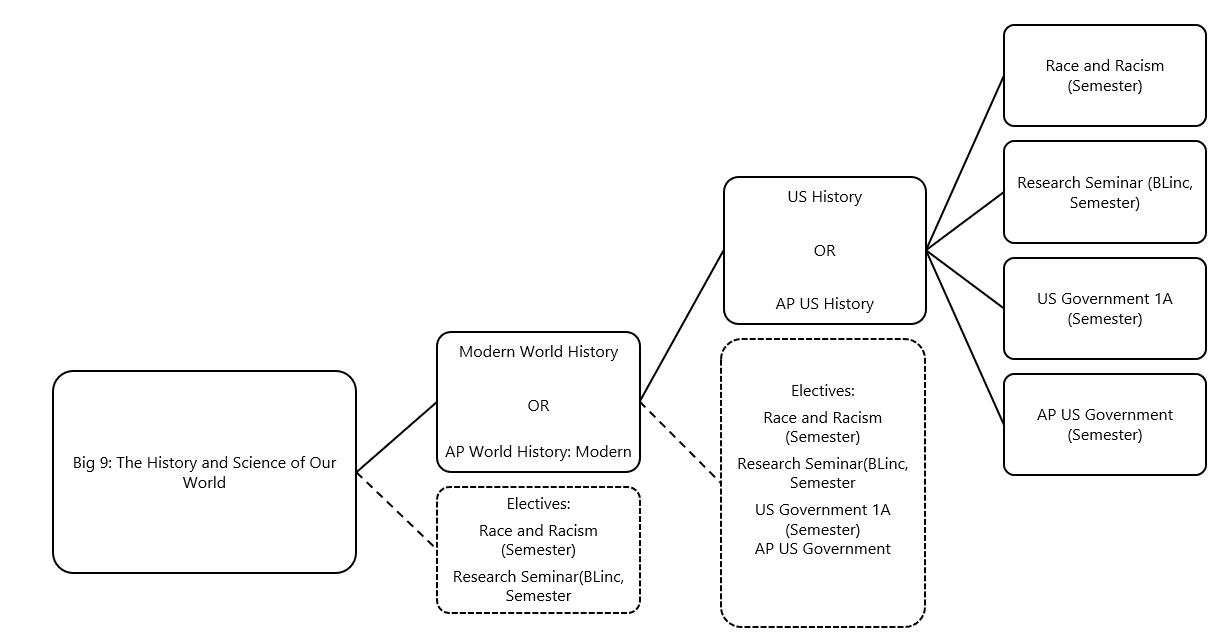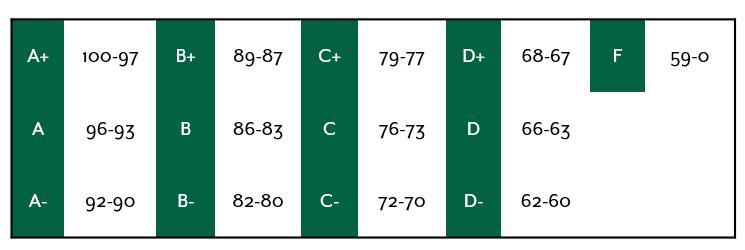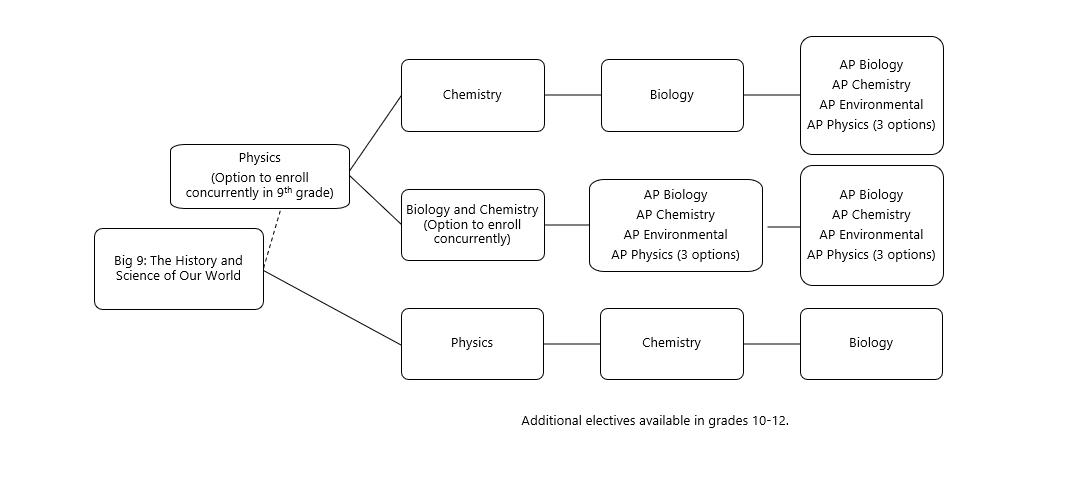
6 minute read
ENGLISH
English
Course Sequence
Advertisement
English 9
English 9 focuses on both literature and composition. To broaden their understanding of both the similarities and differences of lives around the world, students primarily read literature with settings outside of the United States, exploring literature as both a mirror and a window and considering identity in the context of community. Through close readings and discussions of fiction, poetry, and nonfiction by diverse authors, students further develop their ability to analyze and think critically about language. Students have the opportunity to develop their communication skills in the areas of reading, writing, listening, and speaking; they learn to express their ideas more effectively as they engage in discussion and create, revise, and share different types of formal and informal writing throughout the year. 9
English 10
English 10 is a broad survey of American literature. Students read both historical and contemporary works, including novels, plays, and short stories by writers who represent the diversity of the American experience. Readings are placed in historical and cultural context through accompanying lessons on various periods in American history. Students develop and apply critical thinking skills through selected texts, and learn how to present written analysis of readings in thesis-driven analytical essays. Analytical skills are further deepened and applied through class discussions on selected readings and related articles. Students emerge from English 10 with appreciation of and experience with different forms of literature, knowledge of literature’s cultural impact throughout America’s history, and the ability to produce clear and forceful analytical writing. 10
English 11
This writing-intensive course prepares students for both college reading and writing experiences. Students read and write in a variety of modes and genres. The readings introduce students to several literary genres as students learn strategies for understanding and analyzing more complex texts. Students write frequently in both informal and formal formats, composing with increased clarity and sophistication. Core writing skills, different organizational structures, the writing process, and research and citation skills are emphasized. 11
AP Language and Composition
The AP English Language and Composition course focuses on the rhetorical analysis of nonfiction texts and the development and revision of well-reasoned analytic and argumentative writing. The course requires students to become skilled readers of prose written in a variety of contexts and skilled writers who compose for a variety of purposes. Students analyze nonfiction writing by major literary figures, and they synthesize and cite evidence to support their arguments. As both readers and writers, students consider the decisions writers make as they compose and revise. Major units include rhetorical analysis and close reading, argument, and synthesis essays that require students to evaluate and incorporate relevant outside sources. 11
AP Literature and Composition
Note: This course is only offered to seniors. Prerequisite: It is strongly recommended that you complete AP Language and Composition before taking AP Literature and Composition. The AP English Literature and Composition course focuses on imaginative literature: fiction, poetry, and drama. Students read, analyze, discuss, and write about both classic and contemporary literature from a variety of periods and in a variety of genres. Students grow in their abilities to read closely, analyze literature
thoughtfully, and write persuasively about imaginative literature. Topics include the functions of character, setting, structure, narration, figurative language, and literary argumentation. Writing assignments include analytical and argumentative essays that require analysis and interpretation of literature. The AP English Literature and Composition course aligns with a college-level introductory literature curriculum. 12
Electives
Creative Writing (Semester)
Note: This course is only available to seniors. NCAA college-bound athletes must either take AP Literature or a semester of Dystopian and a semester of Creative Writing in order to meet eligibility requirements. Creative writing explores many forms of composition and focuses on developing each writer’s individual process and style. In this survey course, students will learn how to write fictional narratives, various forms of poetry, environmental writing, and other forms of creative nonfiction. Each unit will focus on a specific form, medium, and genre. Students will read pieces in each criterion, write their own poetry and prose within those genres, and will workshop all their pieces with fellow classmates. At the end of the course, students will have a solid understanding of each step of the writing process and will be better prepared for college-level writing through a creative approach to teaching practical writing skills. 12
Dystopian, Science Fiction, and Fantasy Literature (Semester)
Note: This course is only available to seniors. NCAA college-bound athletes must either take AP Literature or a semester of Dystopian and a semester of Creative Writing in order to meet eligibility requirements. This one-semester course is a survey of speculative fiction (dystopian fiction, science fiction, and fantasy) from the turn of the century to the present, with particular emphasis on British and American writers. This course uses analysis and evaluation of novels, short stories, nonfiction essays, and film as its foundation. Students read major literary works of each genre while considering how each genre should be defined and how the conventions of each genre have changed over time. Each unit contains correlative material that places these stories into the context of culture and history. 12
Identity and Justice in Literature
This one-semester English elective focuses on literature through a lens of exploring themes of identity and social justice. Through whole-class texts, book clubs, and independent reading, students explore how aspects of identity such as race, class, gender, sexual orientation, nationality, and religion are portrayed in contemporary fiction, as well as considering which stories are being told (and not told) and by whom. Students
also consider how different texts portray, explore, and complicate topics such as justice, privilege, and oppression. By reading and writing critically about these texts, students can develop deeper understandings about themselves, the world, and literature. 11, 12
Journalism and Publications
Prerequisite: Teacher approval Journalism and Publications is a collaborative class that produces the school yearbook while focusing study on writing, photography, and layout design. Students learn the foundational steps of gathering, verifying, synthesizing, and communicating information for news and publication purposes. A mix of assignments exposes students to every aspect of publication production, and students can focus their efforts on writing, photography, or design, or a combination of the three. Classes engage students on the role of journalism in a free society, current events, best practices in writing and reporting, interviewing, editing, photography, and visual presentation. Independent projects challenge students to cover their school and community in a factual, clear, informative and entertaining way through words and images. Newsroom-style collaboration and studentdriven production culminates with publication of the school yearbook. 10, 11, 12
Young Adult Literature
This semester-long course focuses on different genres of contemporary young adult literature, literature written for and marketed to adolescents. Through whole-class texts, book clubs, and independent reading, students analyze the cultural influences of these texts, explore how common topics and portrayal of social issues in young adult literature have changed over time, and consider how young adult literature is both similar to and different from adult literature in terms of literary elements, plot structures, and themes. There are opportunities for writing both analytically and creatively. 11, 12
Global Online Academy English Offerings
Visit https://globalonlineacademy.org/student-program/student-courses and select “Art, Media, and Design” to see approved course offerings through GOA.





